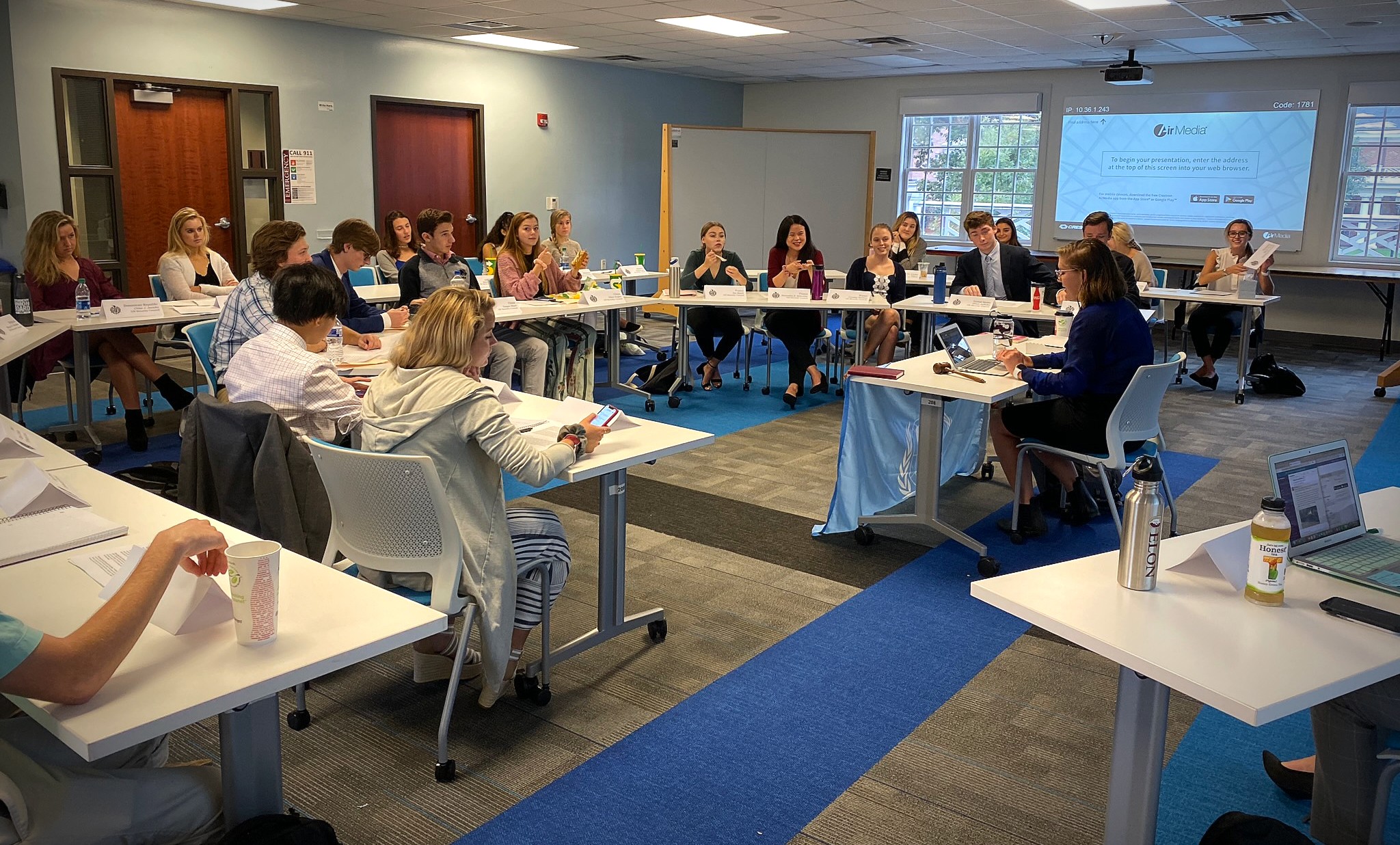The Elon Model United Nations Society hosted the Global Simulation to supplement lessons for students in Elon's COR 110: The Global Experience courses.
World leaders were faced with a crisis: a Canadian vessel captured by Russian troops in the Arctic Ocean. With just 20 minutes to find a solution to a potential global crisis, the United Nations Security Council rushed to make a decision that would bring peace between the two nations.
Fortunately, this was just a simulation — one of several scenarios presented to students during the Elon Model United Nations Society’s Global Simulation in October. The society hosts the simulations to facilitate discussion about topics covered in COR 110: The Global Experience, one of Elon’s First-Year Foundations courses meant to launch the Elon experience by challenging students to think critically, engage globally and communicate effectively.
“I think that it’s really important to learn about the history and workings of the U.N. because you learn to appreciate how important it is that we have it,” said Model U.N. Vice President Derek Dzinich ’20. In his second semester as vice president and seventh semester as a member of Elon’s Model U.N. Society, Dzinich helps organize the simulations, which focus on the workings of the U.N.’s 15-member Security Council.
Due to the large number of people involved in the recent event, students divided into two committees, each of which ran a simulation. Each committee had a chair who oversaw the simulation, and 15 member nations, represented by two students each. Students were assigned a country ahead of the simulation to allow them to research and understand the foreign policy goals they were to represent, but they did not know any of the simulation’s topics ahead of time.
After a 30-minute training session about parliamentary proceedings, the committees were alerted to crisis situations presented on the simulation’s “news” website and social media channels, and then worked to find solutions.

The real-time events are produced by a team in the Model U.N. crisis room. Topics could involve growing tensions between rival nations or a mass migration pushing a nation’s resources to its limits.
“People see the problems with the U.N., and people see the benefits, I think,” Dzinich said. “They really do get a feel for how hard it is to make consensus among 15 completely opposed countries, especially since the goal is peace. So, people see it’s really hard to come to a consensus on those issues, but it’s an important lesson to learn, and I think – at the end of the day – people come away realizing we’re better off.”
Faculty advisor Baris Kesgin, assistant professor of political science and policy studies, Assistant Professor of Human Service Studies Carmen Monico and Professor of Chemistry Karl Sienerth advised three sections of 55 students through the Global Simulation but left the event in the hands of the organization’s student leaders.
“I am proud that Model U.N. is a student-run club and is a fine example of a successful academic club on our campus,” Kesgin said.
While the Global Simulation presents an opportunity for supplemental learning for students in COR 110, Elon’s Model U.N. also provides a simulation for students in POL 141: International Relations.
The Elon Model U.N. Society is ranked in the top 50 of the 2018-19 North American College Model U.N. Final Rankings’ World Division. Students travel to intercollegiate Model U.N. conferences several times each semester, most recently to Massachusetts for the Boston University Area Model U.N. Conference.
“Model U.N. presents multiple opportunities for our students: to engage in meaningful role-play or simulation, to compete at the intercollegiate level, and to assume various leadership positions in the academic club as well,” Kesgin said. “Furthermore, it provides our students a community, during their studies and after.”
Dzinich, a political science and international studies major, has twice traveled to Boston University as well as the U.S. Military Academy at West Point and William & Mary for Model U.N. conferences, but he says travel experiences aren’t all he’s gained from his time in Elon’s Model U.N. He says he’s become a better public speaker and learned a great deal about foreign policy.
“As a student, it’s given me a lot of awesome context that goes along with what I’m learning in the classroom,” he said.



